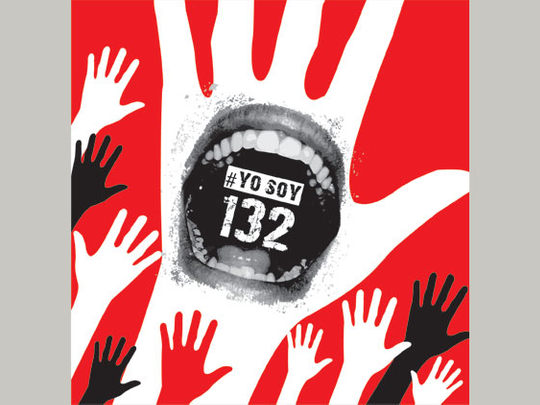
The rise of a social media-based student movement is shaking up Mexico’s July 1 presidential race. This is happening just as the Institutional Revolutionary Party, or PRI — which ruled for seven decades until its defeat in 2000 — seems poised to return to power.
The movement, led by students from the country’s leading private universities in Mexico City, aims to prevent the return of a PRI government and to democratise the mass media.
Spreading rapidly throughout the country since May, it already has had a measurable impact, particularly among young voters and independents who represent 30 per cent and 42 per cent of the electorate, respectively.
The gap between the PRI front-runner and the second-place candidate decreased from 25 per cent to 16 per cent a few weeks after the launch of the movement, according to polls from El Universal-Buendia and Laredo, and from 13 per cent to four per cent, according to Reforma newspaper.
The rise of social protest during an election cycle should not be surprising. Research I have conducted on rural indigenous mobilisation shows that the number of protests tend to increase by 30 per cent during Mexican presidential elections. In states where gubernatorial elections are concurrent with the presidential election — like Chiapas, Jalisco or Morelos — protests increase by up to 150 per cent. These effects are likely to be greater in Mexico’s major urban centres, where university students have played a leading role in different cycles of protest.
What is surprising this time is the unprecedented rise of a social movement led by students from Mexico’s leading private universities — middle-class and well-to-do students who will land elite jobs after graduation. Movements led by students from public universities historically have been associated with the radical left and have not always enjoyed wide voter support. This movement led by private students, however, seems to be attracting the sympathies of the average voter rather than frightening him or her.
Polls show approval rates for the movement ranging from 41 per cent to 47 per cent.
Known as YoSoy132 (“I am number 132”), the movement began as a response to the contentious visit in May by Enrique Pena Nieto, the PRI presidential candidate, to the Ibero-American University — a Jesuit school in Mexico City. Calling him “assassin”, students harshly reminded the PRI candidate of his poor human rights record while governor of the state of Mexico. His police forces had brutally repressed protesters in a 2006 clash in the city of San Salvador Atenco. He defended his actions then as maintaining law and order, which angered the students, who chased him off campus.
Echoing Mexico’s authoritarian past, PRI officials and Televisa — the leading network of Mexico’s television duopoly and a close ally of the PRI — called the students professional agitators and accused them of working for the leftist candidate, Andres Manuel Lopez Obrador of the Democratic Revolution Party, or PRD. In the 1980s, this type of state response would have discredited the students. But after this incident, 131 Ibero students uploaded a video on YouTube showing their university IDs and condemning the PRI and Televisa for manipulating information.
A second video, #YoSoy132, showing students from other private and public universities supporting their 131 Ibero peers appeared shortly after and has gone viral. All this is having an effect in the polls. Voter support for the PRI candidate declined significantly among young, university-educated and independent voters, and the left has capitalised on this.
Targeted
Three factors related to the dramatic deterioration of Mexico’s social climate as a result of the war on drugs explain why young Mexicans are receptive to the message of YoSoy132.
Young males (ages 18 to 29) make up the vast majority of the nearly 60,000 deaths from Mexico’s drug wars. Young unemployed men are being recruited into criminal insurgent groups to fight inter-cartel battles and the war against the federal government. Young university students with no criminal connections have become targets of cartels and government security forces in conflict areas. The drug wars have transformed the daily lives of Mexico’s youth. They can no longer go out freely to bars and discos and increasingly have had to limit their socialising to their parents’ homes. Universities in Mexico do not have lodging facilities and students generally live with their parents until their mid-20s.
As a result of the drug wars, the nation’s young people have turned to social media as their main source of information on local politics and violence. In a country where democratic institutions prevent, rather than facilitate, electoral accountability, social pressure from below has become a crucial means to keep political elites in check. In a country where political elites and the mainstream media continuously try to thwart the citizens’ voice, the sound and fury of the streets have become a beam of hope — a hope for a “Mexican Spring.”
— Los Angeles Times
Guillermo Trejo is an assistant professor of political science at Duke University and the author of the forthcoming book Popular Movements in Autocracies.








